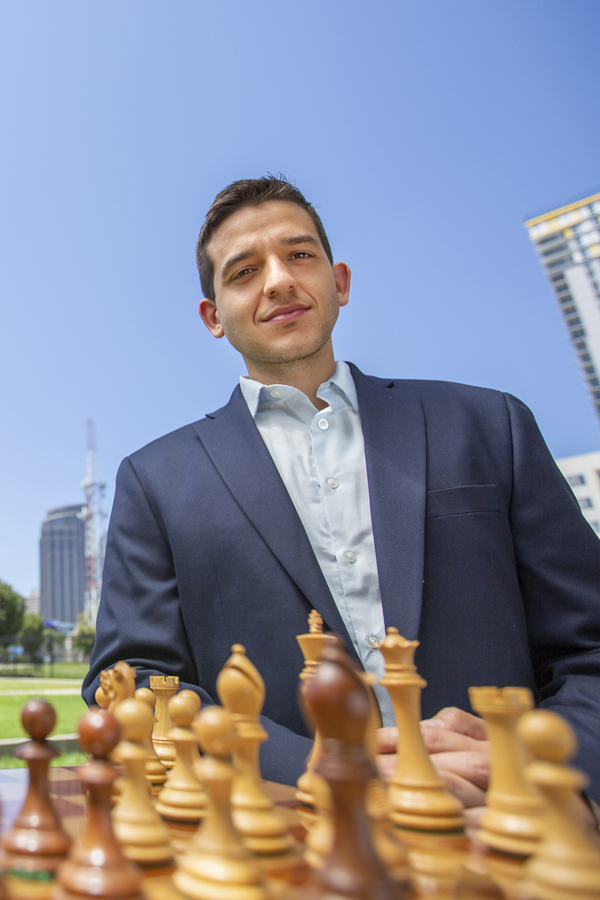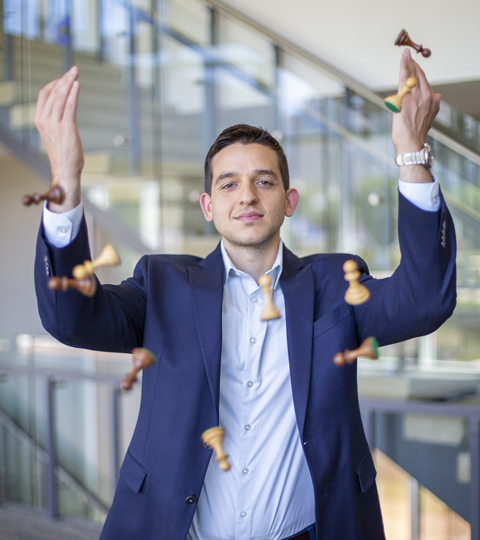Queen City Gambit
Peter Giannatos 14' is bringing national prominence to Charlotte’s chess community.Queen City Gambit
Peter Giannatos is bringing national prominence to Charlotte’s chess community.

“For me, introducing chess to more people is very important.”
Chess players spend years — even decades — mastering the game. Keeping in mind its 1,500-year history and pandemic-sparked popularity boom, Peter Giannatos ’14, founder and executive director of the Charlotte Chess Center, aims to extend the game’s reach in Charlotte to unprecedented lengths.
“For me, introducing chess to more people is very important,” said Giannatos, who opened the center in 2014 before graduating from UNC Charlotte later that year. The center — the only one of its kind in Charlotte — serves as an educational hub for players of all ages and skill levels as well as a host for year-round classes, camps and tournaments.
The idea to establish a chess center in Charlotte originated as early as 2007, when Giannatos and like-minded players co-founded the Queen City Chess Association. Dozens of players met weekly at the Asian Herald Library and often held events at the Cone University Center to hone their strategies and share ideas. “That’s how we planted the seed,” he said.
“For me, introducing chess to more people is very important”
Chess players spend years — even decades — mastering the game. Keeping in mind its 1,500-year history and pandemic-sparked popularity boom, Peter Giannatos ’14, founder and executive director of the Charlotte Chess Center, aims to extend the game’s reach in Charlotte to unprecedented lengths.
“For me, introducing chess to more people is very important,” said Giannatos, who opened the center in 2014 before graduating from UNC Charlotte later that year. The center — the only one of its kind in Charlotte — serves as an educational hub for players of all ages and skill levels as well as a host for year-round classes, camps and tournaments.
The idea to establish a chess center in Charlotte originated as early as 2007, when Giannatos and like-minded players co-founded the Queen City Chess Association. Dozens of players met weekly at the Asian Herald Library and often held events at the Cone University Center to hone their strategies and share ideas. “That’s how we planted the seed,” he said.
Growing Impact
Today, more than 2,000 children learn chess every week at school through Charlotte Chess Center programs. More than 600 students attend the center’s summer camps, while another 500-plus have competed in chess tournaments so far this year. Giannatos says many parents enroll their children at the center to support their overall development. Chess — which Giannatos refers to as a “mind sport” — exercises the brain by improving memory, increasing self-awareness and developing thinking skills.
When the budding entrepreneur moved from Pennsylvania to Charlotte in 2001 with his parents, restaurateurs who opened a diner in Rock Hill, South Carolina, Giannatos already knew chess. However, he lacked formal training and eagerly picked up pointers from a restaurant patron. “The thrill of winning and beating someone at a game intellectually became enjoyable,” he said.
“The more I played, the more I sharpened my critical, analytical and objective thinking,’’ Giannatos continued. “There are pros and cons to all decisions; your goal is to think objectively, weigh risks and make the best decision you can based on your ability. That’s chess, too.”
Growing Impact
Today, more than 2,000 children learn chess every week at school through Charlotte Chess Center programs. More than 600 students attend the center’s summer camps, while another 500-plus have competed in chess tournaments so far this year. Giannatos says many parents enroll their children at the center to support their overall development. Chess — which Giannatos refers to as a “mind sport” — exercises the brain by improving memory, increasing self-awareness and developing thinking skills.
When the budding entrepreneur moved from Pennsylvania to Charlotte in 2001 with his parents, restaurateurs who opened a diner in Rock Hill, South Carolina, Giannatos already knew chess. However, he lacked formal training and eagerly picked up pointers from a restaurant patron. “The thrill of winning and beating someone at a game intellectually became enjoyable,” he said.
“The more I played, the more I sharpened my critical, analytical and objective thinking,’’ Giannatos continued. “There are pros and cons to all decisions; your goal is to think objectively, weigh risks and make the best decision you can based on your ability. That’s chess, too.”
Culture change: The key word is ‘friendly’
Drawing inspiration from commercialized sports such as poker and billiards, Giannatos says the Charlotte Chess Center, which employs 30 instructors and employees, strives to host events and tournaments for professional players to uplift national chess standards. “We’re developing a chess ecosystem that is friendly to everyone,” he said.
The game’s historic exclusive culture was exposed in the 2020, award-winning Netflix miniseries “The Queen’s Gambit.” When protagonist Beth Harmon, a female chess trailblazer, enters her first state tournament in 1963, she is told at the registration desk by a member of the male-dominated competition, “We don’t have a women’s section.”
While the culture is evolving — today 15% of registered chess players are women — Giannatos recognizes potential to improve access to many groups underrepresented in the game. The center recently initiated outreach to Charlotteans who might not otherwise have the opportunity to participate by offering affordable chess education.
“My own early experiences were less than ideal,” he said. “Unless you had an in or were already really good, it was difficult to step into the chess scene. My mission is to uplift overall professionalism.”
Leveraging a Charlotte education

“Entrepreneurs know that to do something successfully, you must step outside your comfort zone and knowledge base.”
Giannatos, whose interest in economics at UNC Charlotte’s Belk College of Business was fueled by the presence of the local banking industry, attributes an ability to organize and implement ideas, develop a business plan and navigate the challenges of entrepreneurship to his business education.
He applies those skills to the Charlotte Chess Center — and it has become a model for chess centers across the country. The United States Chess Federation named Charlotte Chess City of the Year in 2018. In 2019, the organization named Charlotte Chess Club its Club of the Year.
Giannatos plans to support hopeful entrepreneurs toward similar success by engaging with enrollees of the new Undergraduate Certificate in Entrepreneurship, launched this fall by the Belk College of Business. He believes the program is pivotal to supplying Charlotte with innovative entrepreneurial thinkers.
“Entrepreneurs know that to do something successfully, you must step outside your comfort zone and knowledge base,” he said. “As an entrepreneur, I want to learn by doing. I want to know what happens, not what is supposed to happen. Creating the system for cultivating entrepreneurial spirit and know-how in our own backyard is key.”
Written by Gavin Stewart, Photos by Ryan Honeyman.
Leveraging a Charlotte education

“Entrepreneurs know that to do something successfully, you must step outside your comfort zone and knowledge base”
Giannatos, whose interest in economics at UNC Charlotte’s Belk College of Business was fueled by the presence of the local banking industry, attributes an ability to organize and implement ideas, develop a business plan and navigate the challenges of entrepreneurship to his business education.
He applies those skills to the Charlotte Chess Center — and it has become a model for chess centers across the country. The United States Chess Federation named Charlotte Chess City of the Year in 2018. In 2019, the organization named Charlotte Chess Club its Club of the Year.
Giannatos plans to support hopeful entrepreneurs toward similar success by engaging with enrollees of the new Undergraduate Certificate in Entrepreneurship, launched this fall by the Belk College of Business. He believes the program is pivotal to supplying Charlotte with innovative entrepreneurial thinkers.
“Entrepreneurs know that to do something successfully, you must step outside your comfort zone and knowledge base,” he said. “As an entrepreneur, I want to learn by doing. I want to know what happens, not what is supposed to happen. Creating the system for cultivating entrepreneurial spirit and know-how in our own backyard is key.”
Written by Gavin Stewart, Photos by Ryan Honeyman
